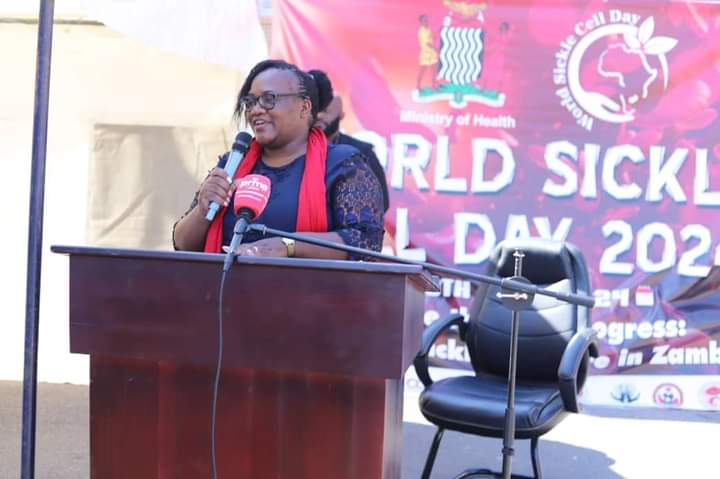
Ministry of Health says it has equipped itself in the fight against Sickle Cell.
Health Permanent Secretary for Technical Services, Kennedy Lishimpi, who was represented by Clinical Care Specialist for Lusaka Province Sophia Musiska, said this during the commoration of the World Sickle Cell Day at UTH themed” Hope through progress: Advancing Sickle Cell Disease care in Zambia.”
Dr. Lishimpi said in order to curb Sickle Cell, the Ministry of Health has set up more units that care for Sickle Cell patients in Kapiri Mposhi and Mwachisompola the under the PEN- plus program and at Mansa Hospital with the help of the Zambia Childhood Cancer Foundation ZACCAF.
He said additional clinical care guidelines have been given to health worker’s taking care of patients at primary health care level.
And stated that this will help standardize as well as provide a continuum of care from primary to tertiary level care.
Dr. Lishimpi also revealed that Hydroxyurea, disease modifying drug for Sickle Cell, is now a drug on the Zambia essential drug list and can be accessed through NHIMA.
He further said the UTHs – CH and Chipata General hospital have been screening children for risk of stroke using the transcranial doppler (TCD) machine since the beginning of 2022.
Dr. Lishimpi said with now 6 machines, 2 other hospitals will soon be screening children with Sickle Cell Disease for risk of stroke and added that the UTH is able to provide advanced care to the patients who can now access Red Cell and Plasma exchange transfusions at the facility.
He further revealed that Zambia will soon host an international meeting of experts in the Sickle Cell Disease, who will look at updates in the new born screening.
Meanwhile, consultant in charge of the Haematology Unit and also Sickle Cell Disease focal person for Zambia, Catherine Chunda, urged everyone to know their Sickle Cell status.
Dr. Chunda said everyone including newborns should be screened and advised couples ready for marriage to know their Sickle Cell status.
She lamented on the stigma that most patients have facing and hoped that with enough sensitisation, the community will show more love and compassion to the patients.
And 15 year old Ntambo Chibilu who is a Sickle cell Disease worrior and frequent patient at the UTH thanked its staff for the care and support given to her during her fears. She however appealed for more man powerfrom the facility to the patients and enough insightful materials, to equip patients with information on how to handle the disease.
Sickle Cell disease is an inherited blood disorder which is marked by flawed haemoglobin. It changes Red blood cells into stiff sticky cells that block blood flow.
ENDS//



